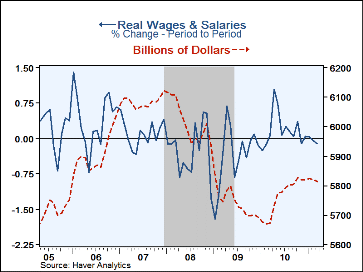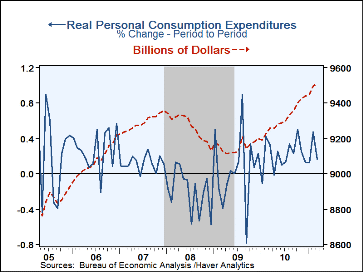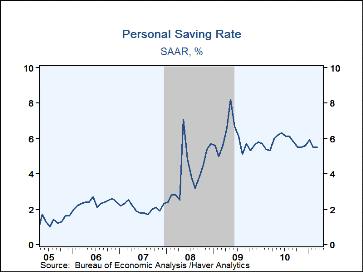 Global| May 03 2011
Global| May 03 2011Higher Prices Erode U.S. Wages And Threaten Consumer Spending
by:Tom Moeller
|in:Economy in Brief
Summary
Reported Friday was a hefty 0.6% gain in March disposable personal income. As we noted then, the strength of the nominal increase was limited to an outsized 2.7% rise in rental income, the third consecutive monthly such gain. Wage and [...]
 Reported Friday was a hefty 0.6% gain in March
disposable personal income. As we noted then, the strength of the nominal increase
was limited to an outsized 2.7% rise in rental income, the third
consecutive monthly such gain. Wage and salary growth, however, remained
roughly stable at a moderate 0.3%. In contrast, prices rose a
considerable 0.4%. The simple math behind this report is that adjusted
for inflation, wage growth has turned negative in 2011.
Reported Friday was a hefty 0.6% gain in March
disposable personal income. As we noted then, the strength of the nominal increase
was limited to an outsized 2.7% rise in rental income, the third
consecutive monthly such gain. Wage and salary growth, however, remained
roughly stable at a moderate 0.3%. In contrast, prices rose a
considerable 0.4%. The simple math behind this report is that adjusted
for inflation, wage growth has turned negative in 2011.
The slight decline in real wages this year resulted from higher energy and food costs. For the quarter real wages fell at a 0.2% annual rate after increasing 0.4% during all of last year. Of course, if the lift to inflation subsides in coming months, real incomes would be bolstered. In Q1, however, real spending power is falling.
So far, consumers have ignored the shock. Real personal consumption expenditures rose 0.2% in March and at a 2.7% annual rate for Q1.Consumers have been able to resist the need to restrain spending, due to a high savings rate. During Q1, it stood at 5.6%, down negligibly from 5.8% last year. Strength in the stock market also has lent a sense of well being which aids spending. But over both the short and long term, it's real wage growth which is the greater force behind spending. During the last ten years, the correlation between the growth in real PCE and real wages is 79%. Thus, the prognosis for near-term gains in consumer spending is in doubt. An easing of the pressure from higher energy and food costs would help.
The personal income & consumption figures are available in Haver's USECON and USNA databases.
| Nominal & Real Income (%) | Mar | Feb | Jan | Y/Y | 2010 | 2009 | 2008 |
|---|---|---|---|---|---|---|---|
| Disposable Personal Income | 0.6 | 0.4 | 0.8 | 4.6 | 3.1 | 0.7 | 5.1 |
| Wages & Salaries | 0.3 | 0.4 | 0.4 | 4.4 | 2.1 | -4.3 | 2.1 |
| PCE Chain Price Index | 0.4 | 0.4 | 0.3 | 1.8 | 1.7 | 0.2 | 3.3 |
| Energy | 3.7 | 3.5 | 2.3 | 15.3 | 10.3 | -19.2 | 14.3 |
| Food | 0.8 | 0.8 | 0.7 | 2.9 | 0.4 | 1.3 | 6.0 |
| Less Food & Energy | 0.1 | 0.2 | 0.2 | 0.9 | 1.3 | 1.5 | 2.3 |
| Real Personal Disposable Income | 0.1 | 0.0 | 0.5 | 2.7 | 1.4 | 0.6 | 1.7 |
| Real Wages & Salaries | -0.1 | -0.1 | 0.0 | 2.5 | 0.4 | -4.5 | -1.1 |
Tom Moeller
AuthorMore in Author Profile »Prior to joining Haver Analytics in 2000, Mr. Moeller worked as the Economist at Chancellor Capital Management from 1985 to 1999. There, he developed comprehensive economic forecasts and interpreted economic data for equity and fixed income portfolio managers. Also at Chancellor, Mr. Moeller worked as an equity analyst and was responsible for researching and rating companies in the economically sensitive automobile and housing industries for investment in Chancellor’s equity portfolio. Prior to joining Chancellor, Mr. Moeller was an Economist at Citibank from 1979 to 1984. He also analyzed pricing behavior in the metals industry for the Council on Wage and Price Stability in Washington, D.C. In 1999, Mr. Moeller received the award for most accurate forecast from the Forecasters' Club of New York. From 1990 to 1992 he was President of the New York Association for Business Economists. Mr. Moeller earned an M.B.A. in Finance from Fordham University, where he graduated in 1987. He holds a Bachelor of Arts in Economics from George Washington University.








